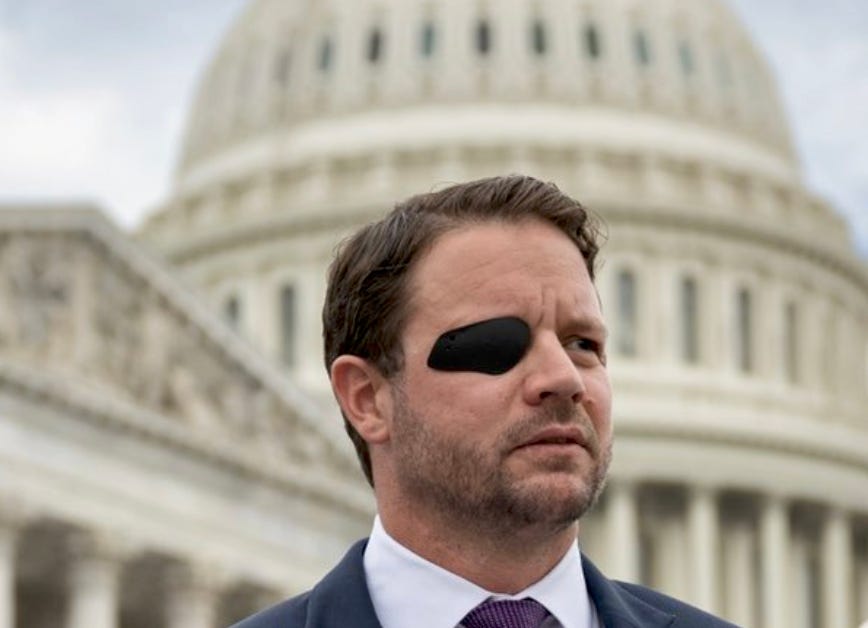Crenshaw: “Mexican drug cartels are actually scared of pissing off the American military”
Rep. Crenshaw tells me he wants the United States to reinforce Mexican security forces not to act unilaterally
“Mexican drug cartels are actually scared of pissing off the American military and getting us invited into the fight,” Rep. Dan Crenshaw said to me in an interview Thursday, the day after the Mexican Senate approved a group of U.S. special forces to come to Mexico and train troops. A former Navy SEAL, Crenshaw has introduced legislation for a so-called AUMF, or authorization of U.S. military force against cartels, a notion firmly rebuked by the Mexican president. However, Crenshaw said to me the aim was to reinforce Mexican security forces not for U.S. troops to act unilaterally. He also said it’s not necessary to label cartels as terrorists to hit them and such a designation could increase asylum claims.
Rep. Crenshaw made the comments in an interview via Zoom following a meeting with the Congressional “Task Force to Combat Mexican Drug Cartels,” which he chairs. A Republican from Texas who lost an eye serving in Afghanistan, Crenshaw has been at the forefront of pushes for increased action against cartels amid record overdose deaths in the United States. After he introduced the AUMF in January, a slew of Republican presidential candidates joined calls for U.S. military action against the crime networks.
The proposal has met widespread criticism on both sides of the Rio Grande. I personally have stated that while mob violence and drug overdose deaths need to be confronted, U.S. strikes would not stop them as the cartels are simply too big and entrenched, having evolved into sprawling networks involved in everything from human smuggling to oil theft as well as working with corrupt officials. Furthermore, U.S. troops south of the border could create new problems, especially if their actions led to civilian deaths.
Crenshaw said the authorization of military force has two main objectives. First, it recognizes the reality of what cartels are, he argues. “A recognition that they themselves are a paramilitary force and need to be dealt with by military means. The Mexican government already realizes that and acknowledges that and uses the military primarily to target cartels…Then on the other hand, it’s recognition that it is a U.S. problem.”
Secondly, he argues, military force would be a deterrent. The U.S. pressure on the Chapitos (the sons of El Chapo) this year has possibly made them reduce the level of fentanyl trafficking. The threat of U.S. military action, he says, would be a bigger stick to dissuade gangsters from getting too high profile and becoming a target.
“I think in the case of fentanyl, because that is what has woken everybody up to this, you need some kind of deterrent. You need something that says, ‘You have finally pissed off the gringos. You finally did it. We have been ignoring you for 15 years, and you finally pissed them off.’ And I think we have a lot of evidence to suggest the Mexican drug cartels are actually scared of pissing off the American military and getting us invited into the fight…And of course they should be. We are pretty good at this kind of thing even in difficult situations.”
Clip from Rep. Crenshaw interview
Critics have hit back that Crenshaw and others are threatening an actual war with Mexico, which would be catastrophic. Rep. Joaquin Castro, a Democrat who is also from Texas, introduced a resolution in October rebutting the call for U.S. military action against cartels. “War with Mexico would cause devastating loss of life and would be disastrous for millions of Mexicans and Americans living in Mexico,” Castro said.
However, Crenshaw claims that the aim is to work with Mexico not to attack it. He cites stronger U.S. military cooperation with many countries around the world especially Colombia. The U.S. and Colombian armies have a deep relationship although the U.S. troops have largely not been active on the ground there. Both the Colombian and Mexican armies have come under fire for human rights abuses. But Colombia is still cited as a success story in reducing its violence since its height in the 1990s.
“At least in present times there is not really a scenario where a unilateral operation [of U.S. troops in Mexico] would be on the table,” Crenshaw says. “That was what the criticism was. ‘Oh my God, they are talking about tanks rolling over the border and drone strikes,’ and my reaction was ‘Who the hell said that?’…It does require Mexican cooperation. That is the lynch pin…. If they want us to go on target with them and kill bad guys, I want to give our people permission to do that.”
Crenshaw also said he has shifted away from the need to designate cartels as foreign terrorist organizations, which various prosecutors and politicians have pushed for over the last few years. Under such a scheme, groups like the Jalisco New Generation Cartel and Gulf Cartel would be in the same category as Al Qaeda and ISIS.
“It’s not some magic box that comes up with all these new authorities and tools,” Crenshaw said. “We have talked to enough legal experts to tell us it doesn’t help us all that much…Additionally, diplomatically it really pisses off Mexico.”
Furthermore, Crenshaw said designating cartels as terrorists could strengthen asylum claims amid record numbers. And he argued it’s not a strong definition anyway.
“It’s not accurate to say they are terrorists, not exactly that. They are not idealogues. They are violent businessmen mobsters.”
Cartel violence has ravaged Mexico, which has suffered over 400,000 murders since 2006 when President Felipe Calderón first launched a major military offensive against the gangsters. During this time, traffickers have shifted from moving plant-based drugs to synthetic drugs driving soaring overdoses north of the border. The United States suffered more than 110,000 overdose fatalities over the last year according to provisional data, with fentanyl or other synthetic opioids in 70 percent of victims.
Mexico has a painful history of enduring foreign raids and invasions and is a fierce defender of its sovereignty. A strong nationalist, President Andrés Manuel López Obrador has been fervent about rejecting the calls for U.S. intervention.
“It’s an offense to the people of Mexico, a lack of respect to our sovereignty,” he said back in March amid calls from Crenshaw. “In an invasion, we could go to the U.N.”
Even so, López Obrador personally made the request to the Senate for the U.S. military personnel to come with their firearms and train Mexican troops. The officers hail from the U.S. Army's 7th Special Forces Group, which has a history of working in Latin America from the war in El Salvador to the invasion of Panama as well as more recently in Iraq and Afghanistan. They are due to arrive in Mexico on Jan. 22 and operate here for two months.
Michael Burgoyne, a retired U.S. colonel who served as Army Attache in Mexico, said the special forces are not a game changer as U.S. officers have long been involved in training in Mexico. Through the Merida initiative, signed in 2008, the United States also provided the Mexican forces with equipment including Black Hawk helicopters and wire tap gear.
It strikes me that López Obrador could be drawing attention to the special forces to show he is cooperating with the United States amid pressure from the White House. By doing so, he placates the calls for more aggressive U.S. actions.
Burgoyne argues the AUMF itself and talk of direct U.S. military engagement is unhelpful and dangerous. He said it looks like a political measure, which makes Americans feel they can do something about a horrific overdose crisis but doesn’t solve it.
“Are we bored because we don’t have enough going on that we want to engage in military operations in Mexico?” he said. “Clearly the United States is not happy with 100,000 people dying. This a major crisis and a huge problem so this response is we’ve got to do something, and it feels good to Americans because there is this idea that these foreigners are responsible, and we’re going to use military force against them… It’s a mirage. It’s not going to solve the problem and in fact it’s going to create a tons of other problems.”
Burgoyne said that even if Crenshaw claims that the intention is to work with Mexico rather than against it, there is nothing in the AUMF legislation itself that stops unilateral U.S. action. A president could respond to a certain situation and get the approval of Congress to conduct an operation as the United States did in various countries without their permission during the War on Terror.
“His AUMF does not have any of those caveats or restrictions in it,” Burgoyne said. “It really is a blank check for the use of military force by the president. And depending on who the president is, this can be used in a lot of different ways.”
So could this really lead to a confrontation with Mexico? Perhaps a real life example would be something like the massacre of nine Mormon women and children who were U.S. citizens in Mexico in 2019. In the heat of the moment, a president could respond by ordering a strike on a cartel convoy near the border. And if Mexican civilians were killed, the situation would escalate.
“Once you let loose military force,” Burgoyne says, “you don’t know where you are going to end up.”
Top photo from Facebook: Congressman Dan Crenshaw
Lower photo from Instagram: 7thspecialforcesgroup
Copyright Ioan Grillo and CrashOutmedia 2023





I live in a huge enclave of gringos who came here in retirement. Many, if not most, are blindly and blissfully unaware of their personal vulnerability to the cartel that is the shadow government, shadow business and shadow property development in many locations here. The cartel owns outright several elected officials in positions of civic power. The gringos' reaction to a couple corpses found here, some headless bodies found there, news of desaparecidos in this town or that is, "Don't get involved with drugs and you'll be perfectly safe." Just say no, in other words: Nancy would be proud.
Here's the reality, eliding the details of goings-on at dealers and local bosses levels:
1. The biggest municipality here is the birthplace and hometown of the cartel's founder and boss.
2. Because of the area's geography, a single, two-lane thoroughfare, always jammed with (mostly gringo) traffic, is the *only*, repeat ONLY means of accessing the two egress points (some 40 miles apart) leading to major arteries for travel out of the area. Both of these exit points are controlled by the cartel. Even Santa Anna wouldn't fail to see the overwhelming strategic advantage here.
3. There are numerous other assets and stratagems available to the Bad Guys in Black Hats here. Suffice to say that in the event of war or any lesser hostility engaged in by the United States, there would be unparalleled, unimaginable slaughter here. Shut the f___ up, Senator.
Sending US advisors anywhere the results are always the same. They never leave. To me a lot of this from this side is to gloss over certain realities. If there wasn’t the demand there wouldn’t be these problems caused by the suppliers. It’s always been that way. The products just change.